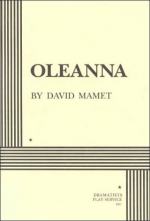|
This section contains 8,630 words (approx. 29 pages at 300 words per page) |

|
SOURCE: Bechtel, Roger. “P.C. Power Play: Language and Representation in David Mamet's Oleanna.” Theatre Studies 41 (1996): 29-48.
In the following essay, Bechtel interprets Oleanna through the ideas of literary theorist Stanley Fish.
Introduction
CAROL:
I don't … lots of the language …
JOHN:
… please …
CAROL:
The language, the “things” that you say …
JOHN:
I'm sorry. No. I don't think that that's true.(1)
David Mamet is nothing if not provocative. Critics and scholars have long held differing interpretations of his plays, and wildly differing opinions of their merit. What they all recognize in common, however, is that Mamet's theatre is one of language. Certainly one of the most striking first impressions of Mamet's writing is the driving sense of rhythm and, in most cases, the abundance of “foul” language. He has more than once been called a “virtuoso of invective.” By his own admission, his aim is to write dramatic poetry...
|
This section contains 8,630 words (approx. 29 pages at 300 words per page) |

|


